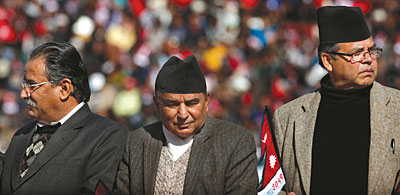 |
Though the possibility of a consensus government under the Maoists has not been completely ruled out until presstime Thursday noon, the roadblocks from the NC and UML remain. The Maoists have finally delivered on their commitment to bring its army under a government-led Special Committee. The risks of the party backtracking (thanks to its history over honouring commitments) and the vacating of cantonments by Maoist ex-combatants not happening are great. But this should not prevent the non-Maoist parties from taking reciprocal action.
The likes of Shekhar Koirala understand what is at stake. He is among those advocating a Maoist-led government provided it makes true its peace-related promises. But some of his own partymen (the so-called hardline faction espousing the no-Maoist-led-government-at-all line) are working behind scenes to not let this happen.
The NC has made all the right moves except making a big mistake over its choice of ministers to represent the party in the UML-led government, thus paralysing itself from day one. Apart from this, the NC stood behind Madhav Kumar Nepal as prime minister through thick and thin even when his own party chairman, Jhala Nath Khanal, did not support him. The Maoists and their apologists tried everything in their arsenal, blowing the trumpet of civilian supremacy over its failed attempt to dismiss the army chief, characterising the government as a bunch of losers (without mentioning Maoist choice for president, Ram Raja Prasad Singh and UML leader Bam Dev Gautam's election status), a disastrous five-day nation-wide strike, and disruptions of parliamentary proceedings including the passage of the annual government budget. It also called the Maoists' bluff on another extension for UNMIN despite pressure from some European embassies. The NC also refused to withdraw the candidacy of Ram Chandra Poudel unless the Maoists relented.
There's truth in Dahal's allegation that India does not want a Maoist-led government unless he and his party bowed to its diktats. The NC did a commendable job in not succumbing to pressure from doomsayers who said the sky would fall if UNMIN left now (we must thank US ambassador Scott H DeLisi for saying just the opposite). The party now needs to withstand pressure from India. It is in India's interests to thwart a Maoist-led government, not ours.
And now when the Maoists have delivered, in part, their side of the deal, the NC is unwilling to play its part. UML chief Khanal will do and say anything to prevent any government which does not have him as prime minister. But why does the NC have to compete with him in obduracy?
During the discussions at the Gokarna Resort on Tuesday, the Maoists objected to the NC and the UML trying to link government formation with the peace process, insisting the two are separate. They are not. The whole idea behind having a new, consensus, government is to complete the remaining tasks of the peace process and finalising the constitution. That was the argument of Maoist Chairman Pushpa Kamal Dahal and Khanal when they worked together to force PM Nepal's resignation as prime minister. Nepal commanded a majority in the parliament and still does. He had resigned to break the deadlock.
The deadline for consensus government is over, but its possibility has not ended. The NC and the UML can, and should, choose not to field any candidate in the election for prime minister in the parliament. Let Dahal lead the government, with important ministries like defence, finance and home going to non-Maoist parties, including Madhes-based ones.
Not making the maximum use of the latest Maoist step (coupled with the ex-combatants' desire to leave the cantonments to integrate into security forces or rehabilitate into society) will be a huge loss. And the NC will have to shoulder the most of the blame.
READ ALSO:
The slap that shook Nepal, ASHUTOSH TIWARI



